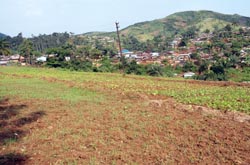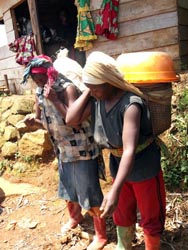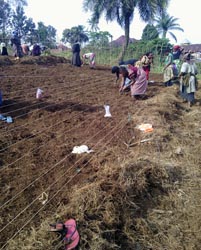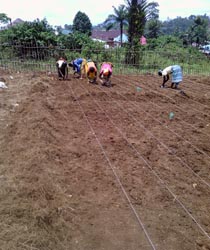N2Africa partnered with Women for Women in Kamituga (South Kivu, DRC). Together they offer the women from this region better opportunities in ‘business’ agriculture than they currently get from heavy work in the mines.
|
This story takes place in Kamituga (28 ° 10’55" E, 3 ° 3’19 "S, 1216 masl), a mountainous and forested region, located 180 km Southwest of Bukavu. The area is characterized by mining. Photo: Site in Kamituga where BANRO SPRL (a private mining company) is in the exploration phase |
 |
Currently, agricultural production in Kamituga is almost all for self-consumption. Farmers are moving away from extensive crops (oil palm) to intensive crops like cassava and groundnuts. Only a small proportion of the local produce is sold. Underlying reasons for low commercial productivity are lack of arable land, repatriation and constant growth of the population. On top of that, farmers are seriously affected by the war and continuous insecurity in rural areas.
 |
The problem for these impoverished farmers is that they have no alternative to supplement their income. Most of the men are involved in mining and do not participate in agriculture. The women therefore deal with problems like lack of arable land, education of children and increased food insecurity. Therefore, these women are also obliged to leave their home villages and get involved in arduous toil in the mines. They really labour as beasts carrying and grinding stones. The women who carry stones are called "Hilux" and those grinding them are called "twangaises". Photo: Twangaises carrying away the result of their grinding labour |
Because the women from Kamituga are continuously marginalized and becoming more vulnerable, Women for Women (WfW) has chosen to extend its activities to this area. The vision is to achieve a situation in which nobody is abused, poor, uneducated or being marginalized. WfW provides skills and resources to women who survived wars, civil strife and other conflicts. The skills and resources help to overcome poverty and any other crisis for self-sufficiency, thereby promoting viable societies.
|
Through the partner WfW, 1800 women have been selected in the Agribusiness project in Kamituga. Four activities have been pointed out: capacity building, dissemination of legume crops (soyabean, bean, peanut), training on soyabean and cassava processing, and monitoring and evaluation. Photos: Women Lead Farmers install demoplots in Kamituga. |
 |
 |
On 10/03/2015 the demonstration field that involved 221 women was established. These women are the group of trainers who will train others on Integrated Soil Fertility Management (ISFM) and the dissemination of soyabean. From this training, other women from Kamituga were happy to know how much they can benefit when they move from subsistence agriculture to business agriculture. For them, the latter can be more promising than the heavy work they were used to in the mines.
Through the partnership between N2Africa and WfW, N2Africa discovered that in Kamituga soil fertility is highly variable. Due to erosion, some parts of the land have only a small amount of humus and colloids. This also results in leaching of mineral fertilizers. N2Africa disseminates different technologies to reduce erosion and increase the amount of organic residues for use after harvest.
Team N2Africa DRC
Jeanmarie Sanginga/ coordinator
Despines Bamuleke/ FLO/ Agronomist
Liliane Bahati/ Rhizobiologist Lab/ Kalambo
